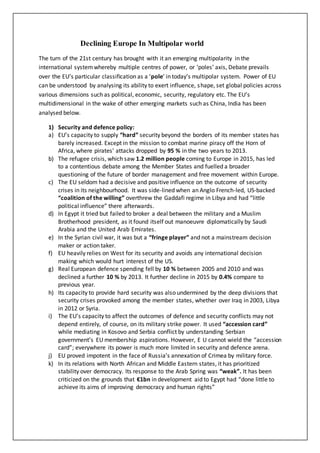Declining europe in multipolar world
- 1. Declining Europe In Multipolar world The turn of the 21st century has brought with it an emerging multipolarity in the international systemwhereby multiple centres of power, or ŌĆśpolesŌĆÖ axis, Debate prevails over the EUŌĆÖs particular classification as a ŌĆśpoleŌĆÖ in todayŌĆÖs multipolar system. Power of EU can be understood by analysing its ability to exert influence, shape, set global policies across various dimensions such as political, economic, security, regulatory etc. The EUŌĆÖs multidimensional in the wake of other emerging markets such as China, India has been analysed below. 1) Security and defence policy: a) EUŌĆÖs capacity to supply ŌĆ£hardŌĆØ security beyond the borders of its member states has barely increased. Except in the mission to combat marine piracy off the Horn of Africa, where piratesŌĆÖ attacks dropped by 95 % in the two years to 2013. b) The refugee crisis, which saw 1.2 million people coming to Europe in 2015, has led to a contentious debate among the Member States and fuelled a broader questioning of the future of border management and free movement within Europe. c) The EU seldom had a decisive and positive influence on the outcome of security crises in its neighbourhood. It was side-lined when an Anglo French-led, US-backed ŌĆ£coalition of the willingŌĆØ overthrew the Gaddafi regime in Libya and had ŌĆ£little political influenceŌĆØ there afterwards. d) In Egypt it tried but failed to broker a deal between the military and a Muslim Brotherhood president, as it found itself out manoeuvre diplomatically by Saudi Arabia and the United Arab Emirates. e) In the Syrian civil war, it was but a ŌĆ£fringe playerŌĆØ and not a mainstream decision maker or action taker. f) EU heavily relies on West for its security and avoids any international decision making which would hurt interest of the US. g) Real European defence spending fell by 10 % between 2005 and 2010 and was declined a further 10 % by 2013. It further decline in 2015 by 0.4% compare to previous year. h) Its capacity to provide hard security was also undermined by the deep divisions that security crises provoked among the member states, whether over Iraq in 2003, Libya in 2012 or Syria. i) The EUŌĆÖs capacity to affect the outcomes of defence and security conflicts may not depend entirely, of course, on its military strike power. It used ŌĆ£accession cardŌĆØ while mediating in Kosovo and Serbia conflict by understanding Serbian governmentŌĆÖs EU membership aspirations. However, E U cannot wield the ŌĆ£accession cardŌĆØ; everywhere its power is much more limited in security and defence arena. j) EU proved impotent in the face of RussiaŌĆÖs annexation of Crimea by military force. k) In its relations with North African and Middle Eastern states, it has prioritized stability over democracy. Its response to the Arab Spring was ŌĆ£weakŌĆØ. It has been criticized on the grounds that Ōé¼1bn in development aid to Egypt had ŌĆ£done little to achieve its aims of improving democracy and human rightsŌĆØ
- 2. l) EUŌĆÖs campaign to ban death penalty has been opposed by many nations including US and India. EU may have contributed to this process of Human rights; its role was not decisive. m) Over the last 20 years, it has been unable to establish a coherent policy for Turkey, and its migration policy is highly controversial. n) European integration is said to have been a prerequisite for peace and stability in Europe itself, and for its own development and prosperity. inward gaze makes them substantially less appealing in the eyes of their neighbours (the Mediterranean states) and also less appealing for those African states strongly connected to Europe and are in search of new partners (those new partners now including China, India, Brazil, etc.) In even more distant countries, Europe has an economic presence (for example, Germany as an investor and exporter) but has no significant political influence due to its inability to take on a ŌĆ£non-European perspectiveŌĆØ 2) Regulatory Power: Despite its economic and political struggles, the European Union exerts considerable influence over worldwide markets through its regulatory and legal framework. a) Is an area in which the EU has expressed its objective to be a world power. The ŌĆśsingle marketŌĆÖ according to EU gives it ŌĆ£potential to shape global normsŌĆØ. Encouraging other countries to adopt European standards and norms in multi- and bilateral negotiations. b) Regulatory policies relating to chemical safety, vehicle safety, pollution are being shaped by EU and followed globally. Many scholars described this as a process of ŌĆ£unilateral regulatory globalization.ŌĆØ c) It is an area in which the EUŌĆÖs power has been growing and it could be rated as the worldŌĆÖs dominant power. The EUŌĆÖs regulatory leadership is a function primarily of the size of its market (500million citizens), the worldŌĆÖs largest, which is underpinned by its relative per capita wealth. It has been bolstered by closer political integration notably on regulatory issues which has facilitated the adoption of common EU standards, and its gradual enlargement -from 12 member states in the mid-1980s to 27 giving it better bargaining power to formulate global norms. 3) Environmental politics: Full Free Document Available on following link. Direct link http://tejasisblog.blogspot.in/2017/05/declining-europe-in-multipolar- world.html Or http://tejasisblog.blogspot.in/



